Rock and roll is a genre of popular music that evolved in the United States during the late 1940s and early 1950s. It originated from musical styles such as gospel, jump blues, jazz, boogie woogie, rhythm and blues, and country music. While rock and roll's formative elements can be heard in blues records from the 1920s, and in country records of the 1930s, the genre did not acquire its name until 1954.
Rhythm and blues, often abbreviated as R&B, is a genre of popular music that originated in African-American communities in the 1940s. The term was originally used by record companies to describe recordings marketed predominantly to urban African Americans, at a time when "urbane, rocking, jazz based music with a heavy, insistent beat" was becoming more popular. In the commercial rhythm and blues music typical of the 1950s through the 1970s, the bands usually consisted of piano, one or two guitars, bass, drums, one or more saxophones, and sometimes background vocalists. R&B lyrical themes often encapsulate the African-American experience of pain and the quest for freedom and joy, as well as triumphs and failures in terms of relationships, economics, and aspirations.
Ska is a music genre that originated in Jamaica in the late 1950s and was the precursor to rocksteady and reggae. It combined elements of Caribbean mento and calypso with American jazz and rhythm and blues. Ska is characterized by a walking bass line accented with rhythms on the off beat. It was developed in Jamaica in the 1960s when Stranger Cole, Prince Buster, Clement "Coxsone" Dodd, and Duke Reid formed sound systems to play American rhythm and blues and then began recording their own songs. In the early 1960s, ska was the dominant music genre of Jamaica and was popular with British mods and with many skinheads.

Doo-wop is a genre of rhythm and blues music that originated among African-American youth in the 1940s, mainly in the large cities of the United States, including New York, Philadelphia, Chicago, Baltimore, Newark, Detroit, and Washington, DC. It features vocal group harmony that carries an engaging melodic line to a simple beat with little or no instrumentation. Lyrics are simple, usually about love, sung by a lead vocal over background vocals, and often featuring, in the bridge, a melodramatically heartfelt recitative addressed to the beloved. Harmonic singing of nonsense syllables is a common characteristic of these songs. Gaining popularity in the 1950s, doo-wop enjoyed its peak successes in the early 1960s, but continued to influence performers in other genres.
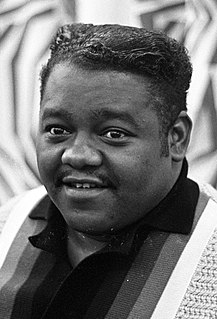
Antoine "Fats" Domino Jr. was an American pianist and singer-songwriter. One of the pioneers of rock and roll music, Domino sold more than 65 million records. Between 1955 and 1960, he had eleven Top 10 hits. His humility and shyness may be one reason his contribution to the genre has been overlooked.
Rocksteady is a music genre that originated in Jamaica around 1966. A successor of ska and a precursor to reggae, rocksteady was the dominant style of music in Jamaica for nearly two years, performed by many of the artists who helped establish reggae, including harmony groups such as The Techniques, The Paragons, The Heptones and The Gaylads; soulful singers such as Alton Ellis, Delroy Wilson, Bob Andy, Ken Boothe and Phyllis Dillon; musicians such as Jackie Mittoo, Lynn Taitt and Tommy McCook. The term rocksteady comes from a popular (slower) dance style mentioned in the Alton Ellis song 'Rocksteady' that matched the new sound. Some rocksteady songs became hits outside Jamaica, as with ska, helping to secure the international base reggae music has today. Despite the name, rocksteady is not directly related to rock.
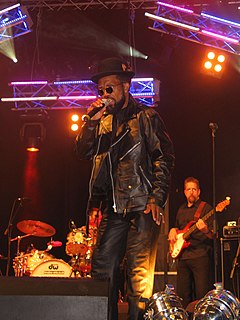
Cecil Bustamente Campbell, known professionally as Prince Buster, was a Jamaican singer-songwriter and producer. The records he released in the 1960s influenced and shaped the course of Jamaican contemporary music and created a legacy of work that would be drawn upon later by reggae and ska artists.

David Louis Bartholomew was an American musician, bandleader, composer, arranger, and record producer. He was prominent in the music of New Orleans throughout the second half of the 20th century. Originally a trumpeter, he was active in many musical genres, including rhythm and blues, big band, swing music, rock and roll, New Orleans jazz, and Dixieland. In his induction into the Rock and Roll Hall of Fame, he was cited as a key figure in the transition from jump blues and swing to R&B and as "one of the Crescent City's greatest musicians and a true pioneer in the rock and roll revolution."
"Blueberry Hill" is a popular song published in 1940, best remembered for its 1950s rock and roll version by Fats Domino. The music was written by Vincent Rose, the lyrics by Larry Stock and Al Lewis. It was recorded six times in 1940. Victor Records released the recording by the Sammy Kaye Orchestra with vocals by Tommy Ryan on May 31, 1940. Gene Krupa's version was issued on OKeh Records on June 3 and singer Mary Small recorded a vocal version on the same label with Nat Brandwynne's orchestra, released June 20, 1940. Other 1940 recordings were by: the Glenn Miller Orchestra on Bluebird Records (10768), Kay Kyser, Russ Morgan, Gene Autry, Connee Boswell, and Jimmy Dorsey. The largest 1940 hit was by the Glenn Miller Orchestra, which reached #2 on the US charts.
People of African descent from the Caribbean have made significant contributions to British Black music for many generations.
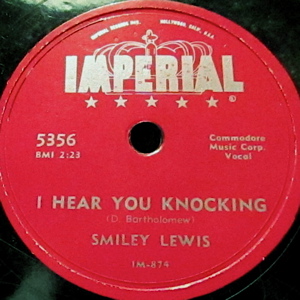
"I Hear You Knocking" is a rhythm and blues song written by Dave Bartholomew. New Orleans rhythm and blues singer Smiley Lewis first recorded the song in 1955. The lyrics tell of the return of a former lover who is rebuffed.

"Land of a Thousand Dances" is a song written and first recorded by Chris Kenner in 1962. The song is famous for its "na na na na na" hook, which Cannibal & the Headhunters added in their 1965 version, which reached number 30 on the Billboard chart. Thee Midniters, an American group out of East Los Angeles, was one of the first Chicano rock bands to cover "Land of a Thousand Dances", scoring a local hit in 1965. The song was also covered by Danny & the Memories, British group The Action, Ted Nugent, the J. Geils Band, and the stars of the 1980s-era World Wrestling Federation. Ike & Tina Turner often performed this song live and it was released on their 1971 album Live In Paris. The song's best-known version was Wilson Pickett's 1966 recording, which became a Hot R&B/Hip-Hop Songs No. 1 and his biggest ever pop hit. Some releases of the song credit Antoine "Fats" Domino as a co-author of the song with Kenner. Domino agreed to record the song in exchange for half of the song's royalties. One of the earliest covers of the song is on Major Lance's debut album on Okeh, The Monkey Time (1963).

The Equals are a British pop, R&B and rock group formed in North London, England in 1965. They are best remembered for their million-selling chart-topper "Baby, Come Back", though they had several other chart hits in the UK and Europe. Eddy Grant founded the group with John Hall, Pat Lloyd, and brothers Derv and Lincoln Gordon, and they were noted as being "the first major interracial rock group in the UK" and "one of the few racially mixed bands of the era".

Rod Bernard was an American singer who helped to pioneer the musical genre known as "swamp pop", which combined New Orleans-style rhythm and blues, country and western, and Cajun and black Creole music. He is generally considered one of the foremost musicians of this south Louisiana-east Texas idiom, along with such notables as Bobby Charles, Johnnie Allan, Tommy McLain, and Warren Storm.
"My Boy Lollipop" is a song written in the mid-1950s by Robert Spencer of the doo-wop group The Cadillacs, and usually credited to Spencer, Morris Levy, and Johnny Roberts. It was first recorded in New York in 1956 by Barbie Gaye. A later version, recorded in 1964 by Jamaican teenager Millie Small, with very similar rhythm, became one of the top-selling ska songs of all time.
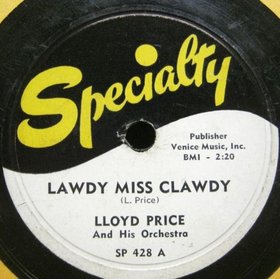
"Lawdy Miss Clawdy" is a rhythm and blues song by New Orleans singer/songwriter Lloyd Price that "grandly introduced The New Orleans Sound". It was first recorded by Price in 1952 with Fats Domino and Dave Bartholomew during his first session for Art Rupe and Specialty Records. The song became one of the biggest selling R&B records of 1952 and crossed over to other audiences. "Lawdy Miss Clawdy" inspired many songs and has been recorded by a variety of artists.
Theophilus Beckford was a Jamaican pianist and one of the pioneers of Jamaican popular music during the transition from rhythm 'n' blues to Jamaican ska.
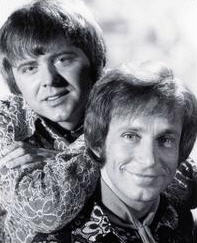
Sidney Thomas "Tommy" Boyce and Bobby Hart were a prolific American duo of singer-songwriters. In addition to three top-40 hits as artists, the duo is well known for its songwriting for The Monkees.

"No More Doggin'" is a rhythm and blues song written and originally recorded by blues musician Rosco Gordon in 1952. The song featured Gordon's signature "Rosco Rhythm" piano style which became a precursor to Jamaican ska music.











